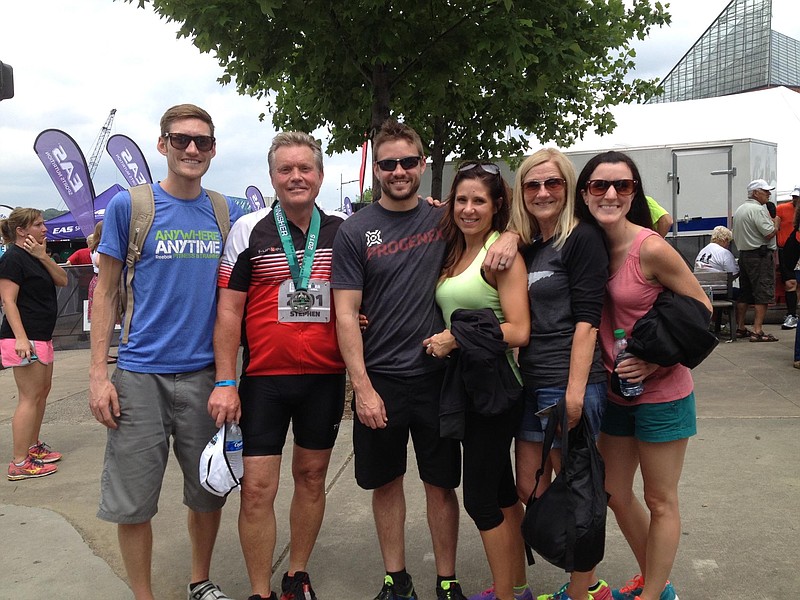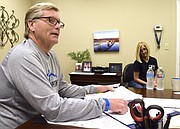Photo Gallery
'Finish what we started:' Father will race in Ironman to honor son after his sudden death
Read more
Ironman 2015: Tips for navigating Sunday's race
Cameron Bean emailed his father a detailed training schedule every week for almost a year.
Swim here, run there, bike this far.
For months, he carefully prepared his dad, Steve Bean, for Sunday's Ironman, a grueling 2.4-mile swim, 112-mile bike and 26.2-mile run packed into no more than 17 hours.
Cameron took to coaching easily. The 28-year-old spent five years as an elite professional runner, even becoming one of the 10 fastest men in the United States in the 3,000-meter steeplechase. He knew how to train.
He gave his dad only one week's worth of training at a time, admonishing Steve to stay focused on the task at hand, not the next week's work. The father-and-son pair biked, ran and swam together. Steve lost 40 pounds.
Two weeks ago, for some reason, Cameron broke from his routine and sent his father the final two weeks of training at once - something he'd never done before.
Then, a week ago today, Cameron went for a run on Moccasin Bend Road. A driver in the far lane swerved across the road and slammed into him. He died two days later on Monday.
Steve will attend his son's memorial service today. And tomorrow, he'll get up and run the Ironman.
"I just feel like we need to finish what we started," Steve said.
The goal is to finish the race for his son - the wild, driven, hug-you-so-hard-it-hurt son he lost.
*****
Cameron's climb into the nation's top runners was unlikely.
Sure, he'd been running all his life - he won his first race as a kindergartner, then ran for Baylor School and Samford University - but when he graduated from Samford, his times were just good, not great.
Still, Cameron wanted to run professionally and set his sights on ZAP Fitness, a nonprofit training facility in Boone, N.C., where post-collegiate athletes can train, earn a salary and compete professionally. Problem was, Cameron wasn't fast enough to qualify for ZAP Fitness. The outfit has two standards - the fastest athletes are fully funded, while runners who meet the second standard receive partial funding.
Cameron met neither.
So in 2010, head coach Peter Rea sent Cameron a stock email, an email he's sent to dozens of athletes. Sounds like you have talent and promise, he said, but you haven't met any of our standards. So here's the deal: if you move here on your own, find a job on your own - a job that allows you to be at practice twice a day, every day, then you can train with us. But that's it. We can't pay you.
"A week later, he was at practice," Rea said. "He said, 'I've got an apartment, I found a place to live and I found a job.' And just so I'm clear, I make that offer all the time and no other athlete in our history has ever done that."
Before long, Cameron was pulling introverted runners out of their shells, rolling up to practice with hip-hop music blasting and blowing the car horn as he pulled into the driveway just to let everyone know he'd arrived. He was boisterous, outgoing, the life of the party, and greeted everyone with "Yo."
That first year, Cameron took over the facility's hot tub - typically used to loosen tight muscles - every Sunday night for Hot Tub Sundays. He'd hype the evening all week, invite everyone, then park his car by the tub, turn up his music and sip on a pitcher of water to stay hydrated.
Once, he filled the tub with bubble bath and glowsticks, then donned a tiny metallic-sheen swimsuit.
"No one else could get a bunch of introverted runners out in a hot tub in the middle of the night listening to blaring hip-hop and throwing bubble bath at each other," said assistant coach Ryan Warrenburg. "It was utterly ridiculous but a lot of fun."
Another time, Cameron showed up at ZAP with a 50-foot-long sheet of plastic and a bottle of soap to make a giant slip-and-slide.
"We ran at it like a bunch of kids," Warrenburg said. "It was quintessential Cameron."
Steve remembers that, too.
"He put that on our credit card," he said.
Despite the antics, Cameron was deeply focused and highly structured. He worked hard and took a nap every day. He was meticulous, goal-oriented. He improved fast.
In college, he ran a 9-minute, 2-second steeplechase. His first year at ZAP, he shaved his time down to 8:47, then 8:37 the next year. He earned a spot as a fully funded athlete and cracked the top 40 steeplechasers in the United States. In his third year, he hit 8 minutes and 32 seconds and cracked the top 10.
"In three years, Cameron went from being - professionally - a nobody to being a real player," Rea said. "Improving your steeplechase time by 30 seconds is virtually unheard of."
That was Cameron. When he decided to do something, he did it. He made it happen.
"He got the most out of 28 years that you can imagine someone getting out of it," Warrenburg said.
After a strong 2013, Cameron's last 18 months at ZAP Fitness were plagued by injuries that limited his ability to train and stay at the top of his game. When his contract ended at ZAP in July, he knew his career as a professional runner was over.
He moved home to Chattanooga, started attending school for massage therapy, took a part-time job at Fast Break Athletics and toyed with the idea of becoming a professional triathlete.
He knew he'd need to improve his swim time to succeed in that world, so he started working with a coach to fine-tune his stroke.
*****
At about 2:30 a.m. Monday, Steve and his wife, Lisa, felt an overwhelming peace.
For two days, the whole family - his brother, sister-in-law and girlfriend - had been praying for a miracle, hoping against hope that Cameron would come back to them.
"We didn't get that, but we did get the miracle of peace and calm," Lisa said. "We just got up and went downstairs at the hospital. I told Steve, 'I feel funny. I'm so calm and so at peace.' And he felt the same way at the same time. I think that's when we received the miracle we prayed for."
The next morning, they had a conversation with a friend who was a doctor.
"I asked him, 'Can you promise me that he is not going to make it?'" Lisa said. "And he said, 'I don't promise, but I'm promising you. He's not going to make it.' When we knew that, told by a friend, then we knew."
Cameron wanted to be an organ donor, and so they made sure his organs went to help five people. Word of his death spread quickly through the running community, and hundreds of people offered condolences, each with a memory or story.
"We didn't realize every person he had touched," Steve said. "It's amazing."
At first, Steve didn't think he could do the Ironman. When he completed the half Ironman in May, Cameron took care of everything - he loaded the gear, planned the meals, made sure Steve got to the right place at the right time, helped him through the transitions.
Now Cameron was gone.
But one of the owners at Fast Break Athletics, Zack Winchester, volunteered to walk Steve through the day, to stand in for Cameron. Steve decided to give it a go.
As he and the family remember Cameron, the memories bounce back and forth from happy to sad.
"Even when we cry, it ends up funny," Lisa said. "There was so much joy in our lives because of him."
Sometimes, he'd drive home to surprise them, and start hitting the horn down the street as he neared the house.
"It was always a great surprise," Steve said. "It'd be like 9 at night, and you'd hear the horn start blowing. And you jump up and - he's home."
Contact staff writer Shelly Bradbury at 423-757-6525 or sbradbury@timesfreepress.com with tips or story ideas.

